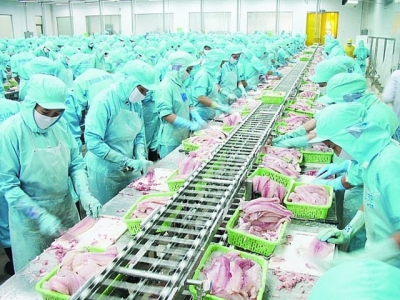Warning that exported seafood has cooled down but it still has a high level

In 2018, although not reaching the amazing figures from 2017, the number of seafood export consignments remain high.
According to the report of the Department of Agriculture, Forestry and Fisheries Quality Control (Ministry of Agriculture and Rural Development), the results of the inspection of food safety conditions for companies which process seafood for export in 2018 show that: There are 507 establishments are first or second class; 82 establishments are third class and 1 establishment is fourth class .
In general, establishments that maintain conditions to ensure food safety in seafood processing are not much changed compared to 2017.
In 2018, 590 seafood processing establishments exported to over 100 countries and territories, including 41 which request business licensing and food safety certification. The total number of inspected and certified shipments requiring certification by inspection agencies was 54,028 an increase of 7.3% compared to 2017.
Speaking at the Conference on the Northern fishing season in 2018-2019, deploying the Southern fishing season in 2019 organized by Ministry of Agriculture and Rural Development and People's Committee of Quang Ninh on March 31, in Ha Long city, Mr. Nguyen Nhu Tiep - Director of Nafiqad said: Through sampling activities to check export consignments as well as taking samples for checking production batches of priority enterprises, the inspection agencies found 70 cases that failed to meet the requirements, up from 60 shipments in 2017 and 47 shipments in 2016.
In 2018, in the main export markets of exploited seafood, Nafiqad received information about 35 Vietnamese seafood export consignments that were notified by the EU and Russian markets because they didn’t reach food safety conditions. In particular, warnings about heavy metal targets accounted for 54.2%; microorganisms account for 20%; histamine accounted for 5.8% and other indicators was 20%.
This warning number has dropped significantly compared to the 55 shipments in 2017 but it was still higher than the 28 shipments in 2016.
Nafiqad's explanation of the sudden increase in the number of shipments in 2017 compared to 2016 was the Central Sea incident, export markets, especially the EU and South Korea had measures to investigate and sample for heavy metal for Vietnamese seafood shipments.
“In 2018, although shipments being warned was improved, it is still high. Therefore, enterprises need to pay attention and actively update the quality control program to effectively control the quality and safety of food products they produce, ”Mr. Tiep said.
Regarding the cause of exported seafood shipments being warned, Nafiqad points out: For heavy metal hazards, it is because of high weight fish. Long-term life and the process of living and feeding causes accumulated heavy metal content.
For histamine and microbial hazards, the main reason is that raw materials and semi-finished products are not preserved and processed at the proper temperature. In addition, there are some cases of ensuring the tool hygiene regime of workers is not guaranteed.
In the future, Nafiqad proposes that related functional units of the Ministry of Agriculture and Rural Development require local agencies, to organize the management, inspect food safety conditions for all fishing ports and fishing ships; guide to support the development and wide-ranging development of link chain models in the exploitation, purchasing and processing of exports to ensure the management and control of food safety and quality.
The seafood processing enterprises should continue to review, update and upgrade the quality management program to effectively control food safety hazards for exploited products.
Related news
 Protein conversion efficiency in aquaculture
Protein conversion efficiency in aquaculture Aquaculture often is promoted on the basis of its importance to global animal protein production. Proteins are made of amino acids which are organic acids
 Additive may lessen effects of soy-induced enteritis in trout
Additive may lessen effects of soy-induced enteritis in trout Trimethylamine oxide may reduce nutritional stress and improve overall performance in farmed rainbow trout.
 Local shrimp farmers to operate on trading floor
Local shrimp farmers to operate on trading floor Local shrimp farmers in the Mekong Delta region and across the country will be able to sell their shrimp products on a trading floor in the coming period.